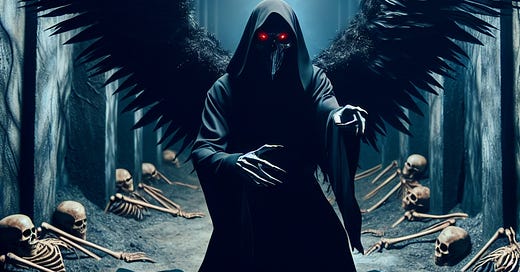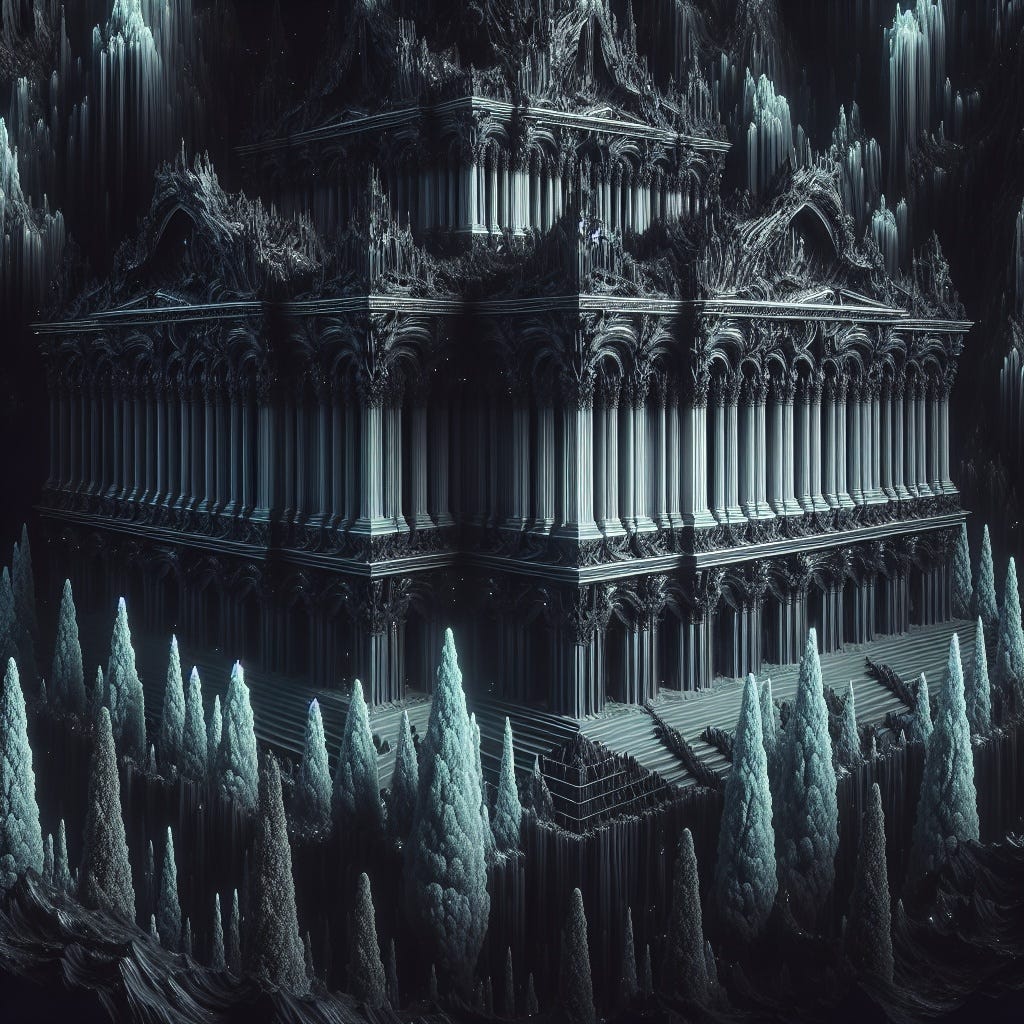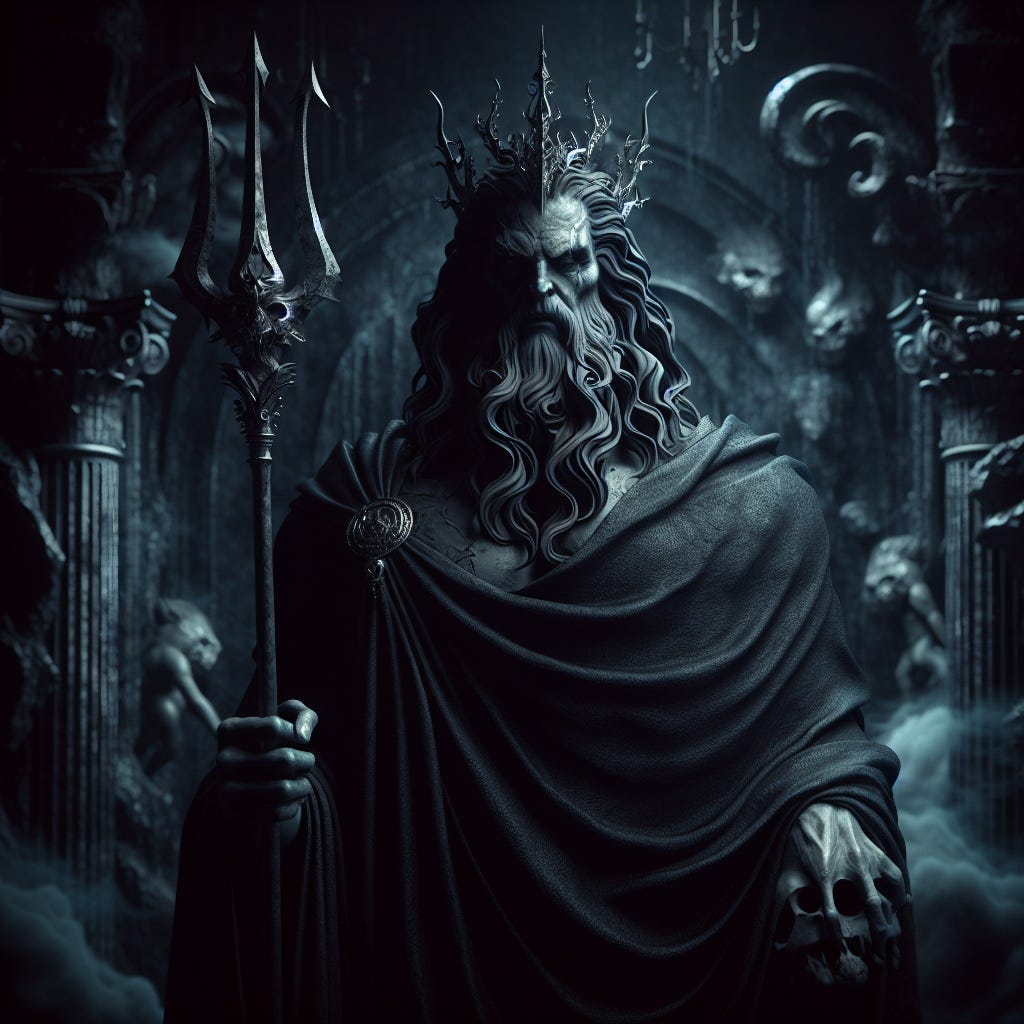(Need other parts of the story? Just click the button below, and you can see all of them, with the most recent on top.)
As the desire for revenge burned through Menippus, he became the shadowy figure he had been before Eros had infused him with power. No, he became even worse. He was like Thanatos—if the god had been a murderer rather than simply the one who claimed the dead.
“How can such evil arise from so much love?’ asked Hecate, backing away from the former scholar.
“The feelings with which Acheron infected him have somehow stripped away the love and left only the underlying power,” said Eros in an eerily calm voice.
“Impossible,” said Night. “But we must withdraw until we can figure out what did happen.”
Night couldn’t be distinguished easily from the surrounding shadows, but she seemed to fade into them. Hecate and Eros were both swallowed by them, leaving Menippus alone.
Becoming more accustomed to his new form and temperament by the second, Menippus decided he should start his revenge with those three, but he couldn’t find them. The cave, which used to have some kind of boundaries, now seemed to stretch out into infinity. Perhaps it was a trick, but it might also have reflected how loose reality was in this part of the Underworld.
Menippus’s perceptions had expanded at least as much as the cave. Night might still be able to hide from him, but she couldn’t entirely conceal the way out. Menippus found it quickly and started to plot his next move.
He needed to get back to an area in which reality was more stable. The region around Hades’s palace, far distant from Sleep and Dreams, should do. Hades could be his first victim. The king of the Underworld was so cold that even some of the gods might not miss him. And once he was gone, Menippus could claim the entire Underworld as his by right of conquest.
That would impress Empusa.
The thought of Empusa made Menippus hesitate for a moment. Wouldn’t it be easier to just find her and declare his love rather than declaring war on the gods? But the part of Acheron within him roared its objection so loudly that the surrounding air vibrated.
Punishing the gods would have to be his first priority.
The geography of the Underworld that Acheron had explained to Menippus now seemed to be laid out like a map in the former scholar’s head. He could see it as clearly as if it were hovering right before his eyes. It was easy for him to fly over the rivers, back the way he had come.
When he arrived at the beach where the dead waited, they took one look at him and scattered like leaves in the wind. They couldn’t get that far away from him, restricted as they were by the Acheron River on one side and by a blank stone wall on the other. Charon, however, stood his ground.
“Begone! You do not belong here!” said the ferryman. This time, his voice sounded like bones breaking.
Again, Menippus hesitated. Since the gods had established the current order of the universe, Charon had done nothing but ferry the dead across the river. Was he a logical target for vengeance?
“How am I trespassing?” asked Menippus, his own voice sounding alien to him, more like swords clanging together than anything the human throat might produce.
“You may have become a god unlawfully, but since you are a god, you have no place in the Underworld. Only those deities who have a function here or whose presence is specifically allowed by Hades may enter.”
“And who will enforce that rule? You?” said Menippus, trying his best to convey utter contempt with his new voice.
“If need be,” said Charon. He stood in front of his dock, dressed like a beggar but pulsing with power.
Menippus was not impressed. Night and Eros were both even more ancient than Charon, and they had fled before the former scholar. With a wave of his hand, he conjured sunlight, though it came out more like fire, and flung it at Charon.
The heat was great enough to melt the sand and pebbles all around Charon into something more like volcanic glass. But the ferryman still stood, a little sooty, but otherwise unscathed.
Menippus was sure he could find the right kind of power to bring Charon to his knees, but why waste his time? The ferryman was not responsible for Menippus’s heartache. The former scholar would simply walk around him.
Menippus took a step toward the dock, but he thudded against an invisible barrier, much like the one that had sealed the Cave of Night.
“What is the meaning of this?” he asked Charon angrily.
“Apparently, you are still human enough somehow to be unable to cross without my permission,” said Charon, his expressionless face managing to look smug.
Menippus realized that he wasn’t sure exactly how much power Eros had given him—or whether it could be exhausted. He had no doubt that he could now tear such a magic barrier to shreds. But the magic here had been in operation for centuries, changing the nature of reality itself. He could feel how strong the magic was, how deeply it was rooted in the ground, how subtly it invaded every breath of air he took. The breaking of such a spell would not be easy.
But perhaps there was another way. Menippus focused for a moment on the mortal world, specifically on the fate of his remains. They had indeed been buried, and the moment he realized that, he also knew he now had an obol in his hand. He tossed it to Charon and felt the magic shift around them.
Charon’s strength lay in his inflexible adherence to the rules—but that was also his greatest weakness. He could no more deny Menippus now that the former scholar had paid any more than he could have let him across without paying.
The invisible barrier faded away. Charon grumbled as he boarded the ferry, but he made no further move to bar Menippus from entering. The former scholar followed him swiftly, eager to reach Hades.
The trip across the river was short, even though Charon seemed to be moving more slowly than he had before. Cerberus eyed Menippus suspiciously, but the hound made no move to attack him when Menippus disembarked. That was just as well. The former scholar doubted he could blame Cerberus for how miserable his life had been up to now. Anyway, he felt no urge to slaughter a dog.
Hades, however, was another matter.
Only a little way past Cerberus was the Field of Asphodel. The pale blossoms were much like the wandering spirits of the indifferent dead, neither good enough to be rewarded nor evil enough to be punished. People used to say that they would wander here forever, but the current thinking was that they would eventually reincarnate. How that worked was uncertain, at least among the people he’d spoken to while he lived.
This time, the dead didn’t react to his presence at all. But that was also consistent with the traditions he’d heard. The indifferent dead tended to fade over time, becoming less and less like the way they had been in life. Not a single one of them seemed to be making much effort to retain human form. Perhaps they had already drunk from the waters of Lethe and forgotten their old selves entirely.
As Menippus left the field, he came to the Place of Judgment, where the dead were sent to the Elysian Fields, the Place of Punishment, or reincarnation, depending upon the decision of the judges.
There were three, all of whom had been sons of Zeus in life: Minos, Aeacus, and Rhadamanthus. They probably looked much as they had during their middle years—a little gray hair in their beards and on the top of their heads, but otherwise, they looked as they would have in their mortal prime.
Menippus had no real quarrel with them. They had been human, just as he had been. He decided to simply walk past them. He could see Hades’s palace looming in the distance. That was where he needed to be.
“Halt!” said Minos as Menippus tried to pass them. “You cannot pass until you have been judged.”
“Can you not see that I am a god?” said Menippus, drawing himself up to his full height and letting his power flare. “I am outside your jurisdiction.”
“Even a god requires the permission of Hades to go any further into the Underworld,” said Aeacus.
Eager to find Hades, Menippus decided to ignore them and continue to walk in the direction of the palace. He felt some magic clawing at him as he moved forward, but it quickly faded. His lost humanity might have left enough of a trace for Charon to demand a coin, but it hadn’t left enough for the judges to force him to heed their commands. As for Hades, he must have relied more on tradition than on power to keep other gods from trespassing in his realm. If he’d left any kind of magical barrier, it was too inconsequential for Menippus to even feel.
As the former scholar approached the palace, surrounded by cypresses that looked gray in the faint light, he noticed that the building itself looked as if it had been carved out of the surrounding rock. Only the presence of black marble softened this impression.
As Menippus reached the steps, he noticed that there was no door or other entrance. Columns hinted at one, even though they were placed too closed together. But even if he squeezed through, beyond them lay only a blank wall. He squinted at the wall in vain. It was no illusion. Nor was there a hidden door. But the absence of an entrance didn’t bother him. He could smash a hole in the wall with his new power if needed.
“It can assume any form I choose,” said a cold voice behind Menippus. He spun around and saw Hades looking at him as if the former scholar were just one more annoyance in a long line of annoyances.
The Underworld King wore a crown that, despite being silver, didn’t shine. He and his robes looked so gray in the ill-lit center of the Underworld that they might almost have been made of stone. Rumors suggested the his long stay in the Underworld had made his heart just as stony as he looked.
Menippus couldn’t help but stare at the trident Hades carried. It lacked the kind of visual glow that powerful artifacts often had, yet he could feel its power throbbing like a giant’s heart.
“One touch will kill any mortal creature,” said Hades in a bored tone that did nothing to hide the obvious threat. “Even to a god, the blow might do permanent damage.”
Now was the moment Menippus had been waiting for. He could lash out at Hades, Acheron’s jailer, and he would be well on the way to revenge. The part of Acheron within him urged him to crush Hades. Yet again, he hesitated.
Within him, a tiny voice asked, “What did Hades have to do with your failure to win Empusa? He hardly ever leaves the Underworld and takes little interest in mortals before their death.”
Once again, he heard Acheron’s roar within him, like the sound of a river in full flood. But it didn’t keep him for hearing the other voice, which kept right on talking. Calm and even, it sounded a bit like Eros’s voice.
Hades eyed Menippus but seemed disinclined to make the first move. If anything, he looked even more statue-like now. The new-made god couldn’t tell whether the Underworld King even breathed.
“Coward!” Acheron roared within him. “Take the power Eros has given you and strike down the eldest brother of Zeus!” The volume increased each second, until it sounded more like the roar of the sea than like a single river. Menippus gathered the power within him. But he still couldn’t quite bring himself to act, no matter how much Acheron protested.
“Where is Empusa?” he asked Hades.
The ruler of the dead shrugged. “Her whereabouts are of little concern to me.”
“But you must know where she is. Is she not one of your subjects?”
“She is more like an occasional visitor. She was born here, though I know not how. But she spends more than half her time in the mortal world. All I can tell you is that when she is here, she follows the law. That is my only concern.”
“He is mocking you!” yelled the voice of Acheron. “Will you allow him to do so?”
“Don’t you know what it is to love?” asked Menippus.
“You’re just stalling,” yelled Acheron. “Finish him!”
Hades sighed in a way that sounded like a dying man breathing his last. “I probably did once. But spending so much time in this place darkens the soul, an effect that only increases with time. Ruling the place is even worse.”
Menippus hadn’t expected that answer. “But if living here is so miserable, why not leave?”
Hades laughed, a sound like claws scraping on wood. “I drew lots with my brothers. As you may have heard, Zeus drew the boundless sky, Poseidon the deep and wide sea—and I, well, I drew this pile of rocks among the shadows. I do leave it occasionally, but as I am obligated to rule it, I cannot stay away long. In any case, living here isn’t miserable. It is more like numbing. Over time, I feel less and less. Perhaps the day will come when I feel nothing at all. I doubt anyone will even notice as long as I fulfill my role.”
“What of Persephone?” Menippus asked. He knew he was probably treading on dangerous ground—but certainly no more dangerous than attacking one of the three most powerful gods.
Hades’s expression changed from blank to slightly sad. “To the extent that I feel for anyone, I feel for her.”
Menippus expected more, but there was no more. Hades’s face looked more like stone than ever.
“Husband, it is time,” said a sweet voice that seemed out of place in the surrounding gloom. Menippus looked behind Hades, and his eyes fell upon a goddess who could only be Persephone.
Though Hades had the look of stone, his queen’s flesh looked alive and warm. She didn’t manage a smile, but at least, she had more expression than a statue, even though her beauty suggested the hand of a master artist. Her dark hair was adorned with flowers that had more color in them than the entire exterior of Hades’s palace. She wore a dark green gown intended to remind a viewer of spring, just as her flower crown did.
She didn’t look happy—but she did look strong. Surrounded by all this gloom, she challenged it rather than surrendering to it.
Menippus couldn’t help being reminded of the dance performed by Eros and Night. Persephone was like that—light and darkness moving together, creating harmony where none had existed before.
“Time for what?” asked Hades, looking a little less as if he had been carved out of the rock.
“You have given Menippus a choice. He could have attacked you, but he hasn’t.”
“Attack him now!” yelled Acheron.
Menippus felt dizzy. A test? This had been some kind of test?
“I think he will when he runs out of small talk,” said Hades. “That should be any time now.”
“No,” said Persephone firmly. “He would find some other excuse not to strike.”
“That’s not true,” said Menippus, trying to placate the voice of Acheron that raged within him. “But wouldn’t you want me to strike Hades down? Wouldn’t that free you from this place?”
Persephone shook her head. “I cried for years when I first came here. But eventually, I realized that there is no point weeping over what cannot be changed. Certain bargains are woven into the very fabric of the universe and cannot be undone short of undoing all creation. The drawing of lots that Hades mentioned is one such bargain. So is my half-marriage to Hades.
“There is no breaking that agreement. Nor would I if I could—now, anyway. For even the realm of the dead needs some life in it. Death is not an end, but a doorway to the afterlife or to another incarnation. Hades is the stern ruler of the dead needed to keep this realm in order. But without me, he would not do well presiding over the transition to the next life.”
“He…he kidnapped you,” said Menippus, whose head was still spinning.
“He took me out of loneliness and a sense that his realm lacked a crucial element. Though I would rather have chosen my husband, if I were given a choice now, I would keep things as they are.”
“He’s had more than enough explanation,” said Hades, glancing at Menippus with what might have been irritation. “He needs to choose.”
“Choose what?” asked Menippus.
“Choose which fork in the path of fate you will follow,” said Persephone. “Make war on the gods because of ideas that Acheron has planted in your head, or join them and begin your life as a god.”
Acheron screamed so loudly in his head that Menippus trembled, afraid his head might explode. Despite being a god, it was hard for him to think.
Hades raised an eyebrow. “Zeus will let him be a god? This is news to me.”
“He will if you are Menippus’s advocate,” said Persephone. “You can swear that the fault was Acheron’s, not this poor child of misfortune.”
Hades gave an almost imperceptible nod, easily the most grudging acquiescence that Menippus had ever seen. But the former scholar had little desire to ponder what it might mean. Acheron picked that particular moment to howl loudly enough to shake every bone in his body.
“I want to be with Empusa.” Menippus’s voice was shaky, but he managed to force the words out. “It matters not in what form I may be—god, man, bodiless ghost. It matters not. Only being with her matters.”
Acheron howled again, and Menippus almost fell to his knees. Could even a god stand so much inner conflict?
“She knows you are here,” said Persephone. “If she wanted to be with you, she would.”
“She’s lying!” yelled Acheron. “Kill her!”
“Bring…bring her here,” said Menippus. “Let me hear that from her own lips.”
“Husband, that might be the fastest way to resolve this situation,” said Persephone.
Hades’s eyes became unfocused for a moment, as if he was trying to see the future. Then he blinked and said, “Empusa! Come here!” His voice didn’t sound especially aloud, but it echoed in a magical way, sending his summons throughout the Underworld.
Much to Menippus’s surprise, Empusa appeared almost immediately, looking exactly as beautiful as when they first met. But she didn’t seem surprised at all. Nor did she look at him. Instead, she focused entirely on Hades.
“What do you require of me, my king?” She asked, bowing slightly.
“It appears that this…new god seeks your hand in marriage,” said Hades, pointing a bony finger at me. “What do you say to his suit?”
Empusa looked in Menippus’s direction for the first time. “It is not in my nature to marry.”
“Remember, I don’t care whether you dine on mortal flesh and blood—as long as you always return to me,” Menippus said, trying not to sound desperate. But even as he spoke the words, he felt the wrongness of them for the first time—despite Acheron screaming in his head. It was strange enough for a husband to invite his wife to have other lovers. But for that husband to be indifferent to his wife’s murders?
What was wrong with him?
Empusa looked at him as if seeing him for the first time. Menippus? You are much changed. And you are so powerful now…but even so, it goes against my nature to wed. You might as well ask Artemis, Athena, or Hestia. All of them would tell you the same. But for them, it is a choice. For me, asking me to marry is as ridiculous as asking fire to become wet or asking air to become solid ground. Even you, powerful as you are, cannot rewrite reality.”
“Yet it is said that Athena persuaded the Furies to renounce vengeance in favor of justice,” said Persephone, looking at Menippus rather than Empusa. “Was that not a change in their nature?”
“What if I ordered you to marry him?” asked Hades, though his voice suggested he didn’t care much one way or the other.
“I would…attempt to obey your command, Majesty,” said Empusa, but she had to force each word out.
“Never fear,” replied Hades. “I would not give you such an order.”
Menippus began to find Acheron’s words more appealing. Hades had brought up giving such a command only to refuse to do it? Surely, that was just another attempt to mock him, even though he could pick Hades up and smash him against the stone walls of his palace.
“Earlier, you expressed shock at the way Hades forced me into marriage,” said Persephone. “Is that really what you want? To compel Empusa to be with you?”
“In human society, a woman is given in marriage by her father, or by the eldest surviving male in her family if her father is already dead,” replied Menippus, though his own words sounded hollow to him. “A woman’s choice need not be considered.”
“But is that what you want?” asked Persephone, her words louder for a moment than Acheron’s. “To possess a woman rather than to win her love?”
A different expression flickered across Hades’s face. The flicker was there only for a moment, but Menippus thought it might be sorrow.
Hades had achieved exactly what Menippus was now asking for—and it had not made him happy. Not at all.
“None of this matters!” bellowed Acheron. “Destroy them all—including Empusa. She is unworthy of you. Slaughter then, and take the Underworld for yourself!”
Destroy Empusa? How could Menippus even consider such a thing?
As for the others, perhaps he could, if not destroy them, at least make them helpless. He could smash Hades’s palace into dust. He could raise the rivers until the Underworld flooded, sweeping the dead back up into the world of the living. He could turn Charon into an oar and use him to row his own ferry. He could strangle Cerberus with his own tail.
But would that make him happy? How could it? Why was he listening to Acheron at all?
The river god kept roaring, but Menippus could now barely hear him. He could hear himself think, however.
Eros had given him power—but Eros was a creator, not a destroyer. Menippus doubted that he could recreate the whole world, but he didn’t need to. All he needed to do was change the nature of Empusa, making her free to choose a different path.
Menippus remembered Eros and Night dancing until each seemed more like the other. He saw them again, as in a vision—only now, Eros had Menippus’s face, and Night had Empusa’s.
Opposites could be brought together. Natures could be changed. One just needed the power—and the will.
Athena had used mere persuasion to change the nature of the Furies. Menippus was sure Persephone had meant that story as a hint to him.
“No!” screamed Acheron.
But it was too late. Menippus was thinking clearly again. He was…himself again. His better self, anyway. He knew what to do.
He shoved Acheron as deep inside himself as he could. Simultaneously, he called on the power of Eros within him. Golden light exploded from him, and he became what he had been for a moment after he first received the power of Eros.
Overcoming Acheron made him feel momentarily weak. Not sure how much power he had left, he focused all the magic he could muster on her.
“Be not as you have been!” he yelled as golden light engulfed her. “Be instead your best self. Be who you would be if you had been born in the light instead of in the darkness.”
Empusa uttered a sound that might be a sigh or a cry. Menippus reached out and danced with her as he had seen Eros dance with Night. But those two primal gods had been much closer in power than Menippus and Empusa were. Black and gold swirled around them, but the gold was by far stronger, more all-encompassing.
By the end of the dance, Menippus no longer heard Acheron at all. The part of the river god that was within him had evaporated, leaving only silence behind.
Gone, too, was his access to the power of river, earth, and sun, but he missed them not at all. Only the love magic he had possessed before Eros had empowered him remained, a gentle warmth inside his heart.
That was more than enough for him.
As for Empusa, she opened her eyes, and Menippus saw that she, too, had changed.
“I accept your offer of marriage,” she said, smiling and reaching for his hand.
Hades grumbled a little. Like Thanatos and Charon, he had become a follower and enforcer of rules. Even gods shouldn’t try to reenact creation. Such things were simply not done. Menippus could read all that and more in his eyes.
Yet when Hades wished to depart with Persephone, he took her hand rather than ordering her to follow. And as she walked away with him, small pink flowers sprouted up from her footprints.
“Those will not last,” muttered Hades, though he sounded almost sad about the quick fading of such blossoms in the Underworld.
Menippus took Empusa in his arms and held her. He never wanted to let go of her again.
They would last. Of that, he was certain.
Did you know I’ve also written novelizations of some Greek myths? Click the button images below for more information.












